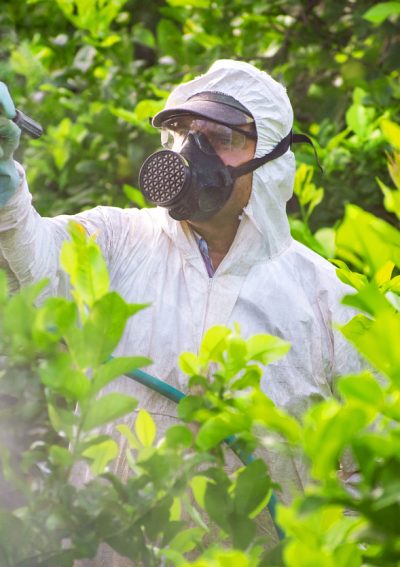Paraquat Lawsuits
Paraquat lawsuits claim the highly toxic weed and grass killer caused people to develop Parkinson’s disease. Lawsuits allege manufacturers knew about the risks but failed to warn the public. People who developed Parkinson’s disease after long-term paraquat exposure may be eligible for compensation.

Latest Updates in Paraquat Lawsuits
As of April 2025, there were 5,911 pending paraquat lawsuits in multidistrict litigation before Chief Judge Nancy J. Rosenstengel of the U.S. District Court for the Southern District of Illinois. MDL actions in the Paraquat Products Liability Litigation are ongoing.
- January 2025: Bellwether trial dates have been set in the Paraquat MDL for October 2025 and April 2026. Bellwether trials are a key step that will help to inform the direction of the litigation.
- November 2024: Calls are growing among lawmakers for paraquat to be banned in the United States. At the start of the month, seven U.S. senators sent a letter to the EPA urging for the banning of the pesticide over its toxicity and ties to serious health issues. That came just a few weeks after 47 members of Congress sent a similar letter to the agency. Paraquat is already banned in dozens of countries.
- August 2024: 10 new potential bellwether cases have been selected by MDL Judge Nancy Rosenstengel to move into discovery. These cases were selected from a group of 16 that were submitted by both parties.
- April 2024: The MDL judge has dismissed four bellwether test trials following the testimony of a key expert for the plaintiffs being thrown out. New cases will be chosen.
- November 2023: ABC News reports that the manufacturer has been aware of these concerns for decades and that this is shown in internal documents.
- September 2023: Judge Rosenstengel postponed bellwether trials to allow for continued Daubert challenge hearings. As Cornell University’s Legal Information Institute explains, “The “Daubert Standard” provides a systematic framework for a trial court judge to assess the reliability and relevance of expert witness testimony before it is presented to a jury.”
- June 2023: Syngenta AG and Chevron U.S.A., the herbicide's U.S. distributor, claim no link between paraquat exposure and Parkinson's disease.
- December 2022: The U.S. Environmental Protection Agency's analysis of paraquat was under review.
- June 2021: Pending lawsuits relating to paraquat were consolidated in a new MDL in the U.S. District Court for the Southern District of Illinois.
- July 2016: The sale and use of paraquat was banned in China.
- July 2007: Paraquat use was banned in Europe and the UK.
Paraquat users from all over the country who were diagnosed with Parkinson’s disease began filing lawsuits against manufacturers in 2017, including Syngenta, Chevron Chemical Company and Growmark Inc. The first jury trial in the federal MDL will be scheduled as soon as the court issues its Daubert decision. A JCCP trial will likely be set in California around that time as well.
Why Are People Filing Paraquat Lawsuits?
People are filing lawsuits because they have been exposed to paraquat and have developed Parkinson’s disease. They have filed paraquat lawsuits against Syngenta, Chevron and other defendants seeking compensation and holding corporations accountable for negligence.
Many of the people who filed lawsuits used paraquat for years without knowing they were at risk of developing Parkinson’s disease. Claims against manufacturers include: design defects, failure to warn, negligence and willful and wanton conduct.
Iowa farmer Doug Holiday, for example, sprayed his land with paraquat beginning in the 1990s. He is suing Syngenta AG and Chevron for what he claims are the companies’ disregard and reckless indifference to the safety of users. He is concerned about his repeated exposure to the herbicide and the increased risk of Parkinson’s disease. His case has been transferred to the paraquat MDL.
Paraquat and Parkinson’s Disease
A recent study demonstrates that the neurotoxic effects of paraquat are directly linked to induced Parkinsonism. The study also emphasizes the importance of controlling exposure to neurotoxic environmental pollutants like paraquat to reduce levels of Parkinson’s disease in the general population.
Syngenta discussed pushing a “coherent strategy across all disciplines focusing on external influencing, that proactively diffuses the potential threats that we face” and attempting to “influence future work by external researchers where possible”
A Guardian investigation revealed manufacturers hid knowledge about toxic effects of paraquat from the scientific community and the public for decades. As manufacturers continue to maintain that paraquat doesn’t cause Parkinson’s disease, their actions have been called “attacks on science, attacks on scientists and attacks on the health of the public.”
Who Is Eligible to File A Paraquat Lawsuit?
People eligible to file a paraquat lawsuit against Syngenta and other manufacturers include agricultural and farm workers who were exposed to paraquat and diagnosed with Parkinson’s disease. If you used paraquat, worked for a company that used the product or were trained and licensed to administer the herbicide you may also be eligible to file a lawsuit.
It’s important that you talk with a qualified paraquat lawsuit attorney about the details of your case. They can evaluate your eligibility, help you assemble the necessary documentation and help you file your claim.
Potential Paraquat Lawsuit Settlements
Any settlements that may result will be based on each client’s individual injuries. Jury verdicts from the first bellwether test trials will help determine what paraquat settlement amount Syngenta could potentially offer.
Paraquat users from all over the country who were diagnosed with Parkinson’s disease began filing lawsuits against manufacturers that include Syngenta, Chevron Chemical Company and Growmark Inc. in 2017. Paraquat lawsuits were consolidated into an MDL in 2021 in U.S. District Court for the Southern District of Illinois.
19 Cited Research Articles
Consumernotice.org adheres to the highest ethical standards for content production and references only credible sources of information, including government reports, interviews with experts, highly regarded nonprofit organizations, peer-reviewed journals, court records and academic organizations. You can learn more about our dedication to relevance, accuracy and transparency by reading our editorial policy.
- United States Judicial Panel on Multidistrict Litigation. (2025, April 1). MDL Statistics Report - Distribution of Pending MDL Dockets by Actions Pending. Retrieved from https://www.jpml.uscourts.gov/sites/jpml/files/Pending_MDL_Dockets_By_Actions_Pending-April-1-2025.pdf
- U.S. District Court for the Southern District of Illinois. (2025, January 23). Order Selecting Plaintiffs for Further Case Specific Discovery. Retrieved from https://ecf.ilsd.uscourts.gov/doc1/06916142865
- United States Senate. (2024, October 31). Dear Administrator Regan. Retrieved from https://www.booker.senate.gov/imo/media/doc/letter_to_epa_re_banning_paraquat.pdf
- U.S. District Court for the Southern District of Illinois. (2024, August 6). Order Selecting Plaintiffs for Case-Specific Discovery. Retrieved from https://ecf.ilsd.uscourts.gov/doc1/06916022314
- Congress of the United States. (2024, October 8). Dear Administrator Regan. Retrieved from https://casar.house.gov/sites/evo-subsites/casar.house.gov/files/evo-media-document/casar-paraquat-epa-letter.pdf
- Steinberg, J. (2023, July 21). Syngenta, Chevron Say No Link Between Paraquat and Parkinson’s. Retrieved from https://news.bloomberglaw.com/product-liability-and-toxics-law/syngenta-chevron-say-no-link-between-Paraquat-and-parkinsons
- Lotshaw, T. (2023, June 9). Chevron, Syngenta Say No Science Backs Paraquat Claims. Retrieved from https://www.law360.com/articles/1687368/chevron-syngenta-say-no-science-backs-Paraquat-claims
- Gilliam, C. (2023, June 2). Revealed: The secret push to bury a weedkiller’s link to Parkinson’s disease. Retrieved from https://www.theguardian.com/us-news/2023/jun/02/paraquat-parkinsons-disease-research-syngenta-weedkiller
- Dorsey, E.R. & Ray, A. (2023, March 6). Paraquat, Parkinson's Disease and Agnotology. Retrieved from https://movementdisorders.onlinelibrary.wiley.com/doi/10.1002/mds.29371
- Moran, G. (2023, March 3). Paraquat, the Deadliest Chemical in US Agriculture, Goes on Trial. Retrieved from https://civileats.com/2023/03/22/Paraquat-the-deadliest-chemical-in-us-agriculture-goes-on-trial/
- Burgoyne, J. (2023, January 27). Paraquat Lawsuit Update July 2023. Retrieved from https://www.forbes.com/advisor/legal/product-liability/paraquat-lawsuit/
- Tong, T. et al. (2022, November). Paraquat exposure induces Parkinsonism by altering lipid profile and evoking neuroinflammation in the midbrain. Retrieved from https://www.sciencedirect.com/science/article/pii/S0160412022004391?via%3Dihub
- Grzincic, B. (2022, February 14). MDL judge advances most paraquat claims against Syngenta, Chevron. Retrieved from https://www.reuters.com/legal/litigation/mdl-judge-advances-most-paraquat-claims-against-syngenta-chevron-2022-02-15/
- Pierson, B. (2021, July 2). Case to Watch: Toxic commercial weedkiller fuels new mass tort. Retrieved from https://www.reuters.com/legal/litigation/case-watch-toxic-commercial-weedkiller-fuels-new-mass-tort-2021-07-02/
- Pierson, B. (2021, June 7). In Brief: S. District Illinois wins fierce battle for paraquat MDL venue. Retrieved from https://www.reuters.com/legal/litigation/brief-so-district-illinois-wins-fierce-battle-paraquat-mdl-venue-2021-06-07/
- Neeley, T. (2021, May 20). Iowa Farmer Sued Over Paraquat Exposure. Retrieved from https://www.dtnpf.com/agriculture/web/ag/crops/article/2021/05/20/legal-challenges-grow-Paraquats
- CDC. (2018, April 4). Facts About Paraquat. Retrieved from https://emergency.cdc.gov/agent/paraquat/basics/facts.asp
- Hakim, D. (2016, December 20). This Pesticide Is Prohibited in Britain. Why Is It Still Being Exported? Retrieved from https://www.nytimes.com/2016/12/20/business/paraquat-weed-killer-pesticide.html
- Dextra International. (n.d.). Chinese Ministry of Agriculture and Rural Affairs: Paraquat Sales Banned in China. Retrieved from https://www.dextrainternational.com/chinese-ministry-of-agriculture-and-rural-affairs-Paraquat-sales-banned-in-china/
Calling this number connects you with a Consumer Notice, LLC representative. We will direct you to one of our trusted legal partners for a free case review.
Consumer Notice, LLC's trusted legal partners support the organization's mission to keep people safe from dangerous drugs and medical devices. For more information, visit our partners page.
855-676-1310

